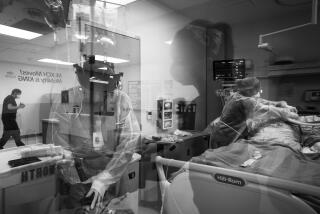Blood tests fail to predict heart risks
- Share via
A new study has dimmed researchers’ hopes of detecting heart disease years before it develops with a battery of laboratory tests done on a single blood sample.
Doctors traditionally rely on factors such as blood pressure, cholesterol levels, smoking, obesity and diabetes to spot people in danger of cardiovascular disease. Many seemingly healthy people have heart attacks and strokes each year, however, and heart disease remains the leading cause of death worldwide.
Investigators have combed through blood samples for years looking for other signs of risk. Among the most promising were levels of C-reactive protein, a measure of inflammation, and homocysteine, an amino acid thought to damage blood vessels. The new study shows those two so-called biomarkers, even when combined with eight others, added little to the current approach.
“Their ability to predict an individual person’s risk, a goal of ‘personalized medicine,’ is still limited,” said Thomas J. Wang, the lead researcher and a cardiologist at Massachusetts General Hospital. Though many markers were linked to higher risk among groups of people, for individuals “even in combination their utility for risk prediction was modest.”
The research involved more than 3,200 people in the Framingham Heart Study, which has followed residents in the suburb of Boston and their offspring for years to glean insights into cardiovascular disease. During 10 years of follow-up, 207 participants died and 169 suffered a first heart attack or stroke or developed heart failure.
The study appeared in the Dec. 21 issue of the New England Journal of Medicine. The National Heart, Lung and Blood Institute, the American Heart Assn. and the American Diabetes Assn. funded the research.






